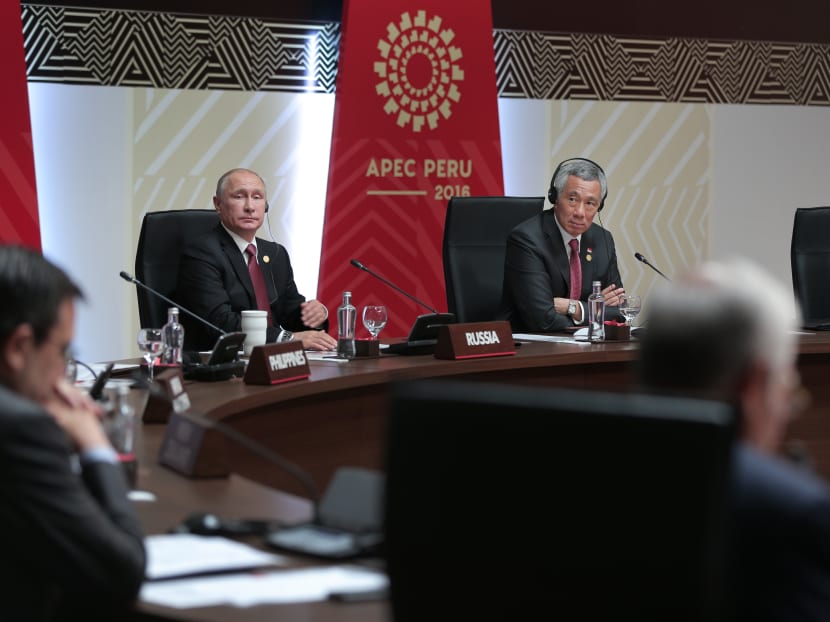Sense of identity will help S'pore avoid divide seen in West: PM
LIMA (Peru) — A sense of identity and togetherness must be developed within Singapore to avoid the kind of deep divide within society that drove voters away from the political establishment, as seen in the recent American elections and Brexit in the United Kingdom, said Prime Minister Lee Hsien Loong.

Singapore's Prime Minister Lee Hsien Loong during a session at the Asia-Pacific Economic Cooperation (APEC) Summit in Lima, Peru. Photo: MCI
LIMA (Peru) — A sense of identity and togetherness must be developed within Singapore to avoid the kind of deep divide within society that drove voters away from the political establishment, as seen in the recent American elections and Brexit in the United Kingdom, said Prime Minister Lee Hsien Loong.
In the United States, there has been a very deep divide between Democrats and Republicans — one that showed up geographically with Republicans dominating the Midwest and the heartlands of the country — while in the UK, there was a divide between London and the rest of the country in terms of education and income, he noted.
While comparisons have been made with the 2011 General Election in Singapore, which saw anger among Singaporeans over immigration policies, there is a “massive difference in scale” compared with what happened in the UK and the US, Mr Lee added.
Commenting on the lessons to be learnt from what happened in the two countries, in an interview with Singapore media at the wrap of the Asia-Pacific Economic Cooperation (Apec) Economic Leaders’ Meeting on Monday (Nov 21), Mr Lee said people were feeling the impact of the changes induced by globalisation, such as job uncertainty.
“You have to address them, you have to make people not only deal with the problems, but make people feel that their concerns have been heard and have been attended to,” he said.
At the same time, leaders must get people to understand that some of these problems are unavoidable and “are not something which the Government can wish away or which are a result of the wrong set of policies”.
“Because technology changes, the economy changes, some of these ... you can’t easily control just by issuing a policy,” he said.
President-elect Donald Trump stunned the world earlier this month by winning the US Presidential Election after a controversial campaign that rode on Americans’ anger at immigration and economic policies that left sections of them behind.
Similar sentiments also drove Britons to vote in favour of Britain leaving the European Union in a national referendum in June.
In any election, a mix of motives drives voters, said Mr Lee.
“It is partly the policies, it is partly the promise, it is partly an emotional identification or of a lack of identification, sometimes it is a desire for change. One of the factors which will influence voters is whether they feel in a good mood or not, whether they are satisfied or not with life, and that depends on what their expectations are and how things have turned out,” he said.
Noting there is no “magic formula” to prevent sentiments seen in the US and the UK from taking hold in Singapore, Mr Lee said: “You have to work together, you have to work hard, the government must have policies which generally will be working for people. At the same time, we have to develop a sense of identity and togetherness within Singapore so that you don’t have a deep divide within the society.”
Social divides cannot be allowed to widen, because rebuilding these bridges will very difficult, he added.
Asked if the Government was looking at policies to redistribute wealth more equally within society, Mr Lee said the emphasis is on giving people the skills to help them in the new economy, and give those who are not doing well an extra leg-up.
Schemes such as Workfare and the Pioneer Generation Package take care of people, as do basic schemes concerning healthcare and the Housing and Development Board’s home ownership programme.
“If you’re in Singapore, not everybody is equally well off, but even if you’re not well off, you’re not badly off,” Mr Lee said.
Pointing out that spending on such schemes had gone up considerably from 10 years ago, Mr Lee added: “I think the spending, the welfare scheme, the social safety nets is one part, but the self-reliance and giving people the ability to look after themselves, and investing in people, I think that is another very important part.”






